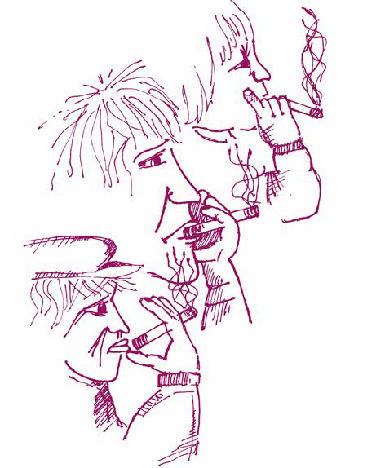Factores biológicos que predisponen la dependencia a sustancias psicoactivas estimulantes
DOI:
https://doi.org/10.31908/grafias.v0i28.1310Palabras clave:
Drogodependencia, estimulantes, genética, abuso de drogasResumen
Este artículo es una revisión bibliográfica sobre la influencia de factores genéticos en la dependencia a sustancias psicoactivas estimulantes. Muchos de los factores biológicos que afectan el riesgo de dependencia de drogas aparentemente actúan a través de un factor general externo. Por otro lado, otros factores genéticos parecen ser específicos a ciertos desórdenes. Si se sabe a ciencia cierta cuáles son estos factores predisponentes, se podría desarrollar pruebas para detectarlos y planes de intervención o prevención para reducir las posibilidades de que las personas caigan en este tipo de adicciones.
Referencias
Agrawal, A.y Lynskey, M. (2006). The genetic epidemiology of cannabis use, abuse and dependence. Addiction 101, 801–812.
Agrawal, A., Edenberg, H y Foroud, T. (2006). Association of GABRA2 with drug dependence in the Collaborative Study of the Genetics of Alcoholism sample. Behavior Genetics 36, 640–650.
Arias, A., Feinn, R. y Kranzler, H.R. (2006). Association of an Asn40Asp (A118G) polymorphism in the mu-opioid receptor gene with substance dependence: A metaanalysis. Drug and Alcohol Dependence, 83, 262–268.
Bart, G., Kreek, M. y Ott, J. (2005). Increased attributable risk related to a functional mu-opioid receptor gene polymorphism in association with alcohol dependence in central Sweden. Neuropsychopharmacology, 30, 417–422.
Befort, K.; Filliol, D.; Decaillot, F. (2001). A single nucleotide polymorphic mutation in the human mu-opioid receptor severely impairs receptor signaling. Journal of Biological Chemistry, 276, 3130–3137.
Bergen, A., Kokoszka, J., Peterson, R. (1997). Mu opioid receptor gene variants: Lack of association with alcohol dependence. Molecular Psychiatry, 2, 490–494.
Beyer, A.; Koch, T.; Schroder, H. (2004). Effect of the A118G polymorphism on binding affinity, potency and agonistmediated endocytosis, desensitization, and resensitization of the human mu-opioid receptor. Journal of Neurochemistry, 89, 553– 560.
Organización Panamericana de la Salud, OPS/ OMS. (2010). Estrategia de Cooperación Técnica OPS OMS; 2006-2010. Disponible en www.who.int/countryfocus/cooperation_ strategy/ccs_hnd_es.pdf
Organización Mundial de la Salud. (2004). Neurociencia del Consumo y Dependencia de Substancias Psicoactivas. Disponible en www.who.int/substance_abuse/ publications/neuroscience_spanish.pdf
MacDonald, Z., Collingwood J. & Gordon, L. (2006). Measuring the Harm from Illegal Drugs Using the Drug Harm Index. Home Office online report. Disponible en www. homeoffice.gov.uk/rds/pdfs07/dp47.pdf
Drgon, T., D’addario, C.y Uhl, G. (2006). Linkage disequilibrium, haplotype and association studies of a chromosome 4 GABA receptor gene cluster: Candidate gene variants for addictions. American Journal of Medical Genetics Part B: Neuropsychiatric Genetics, 141, 854–860.
Kendler KS, Walters EE, Neale MC, et al. (1995). The structure of the genetic and enviromental risk factors for six major psychiatric disorders in women. Phobia, generalyzed anxiety disorder, panic disorder, bulimia, major depression, and alcoholism. Arch Gen Psychiatry, 52, 374-83.
Van den Bree MB, Svikis DS, Pickens RW. (1998). Genetic influences in antisocial personality and drug use disorders. Drug Alcohol Depend , 49, 177-87.
Devor EJ, Cloninger CR. (1989). Genetics of alcoholism. Annu Rev Genet, 23, 19-36.
Noble EP. (1998). The D2 dopamine receptor gene: a review of association studies in alcoholism and phenotypes. Alcohol, 16, 33-45.
Edenberg HJ, Foroud T, Koller DL, et al. (1998). A family-based analysis of the association of the dopamine D2 receptor (DRD2) with alcoholism. Alcohol Clin Exp Res, 22, 505-512.
Kranzler HR, Gelernter J, O’’Malley S, Hernandez-Avila CA, Kaufman D. (1998). Association of alcohol or other drug dependence with alleles of the ñ opioid receptor gene (OPRM1). Alcohol Clin Exp Res, 22, 1359-1362.
Caudill BD, Hoffman JA, Hubbard RL, Flynn PM, y Luckey JW. (1994). Parental history of substance abuse as a risk factor in predicting crack smokers’’ substance use, illegal activities, and psychiatric status. Am J Drug Alcohol Abuse, 20, 341-54.
Tsuang, M, Lyons M, y Eisen, S. (1996). Genetic influences on DSM-III-R drug abuse and dependence: a study of 3,372 twin pairs. Am J Med Gene, 67, 473-477.
Nestler, E. y Aghajanian, G. (1997). Molecular an cellular basis of addiction. Science, 278, 58-63.

